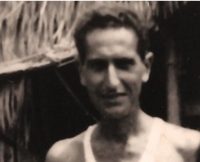At six o’clock at the tailor’s, waiting for my new suit to be finished. The sirens sound a good five minutes after we hear the noise of aircraft engines. There are two of us in the room. It’s badly lit and full of glass cases displaying ties, socks and shirts. My companion, a big American fellow, seems nervous; he asks the time and expresses the puerile fear that the planes will bomb the bridges over the Pasig and it will be impossible for him to get home this evening.
The residents at the hotel are nervous and gloomy. After dinner I suggest a walk as far as the boulevard to two young ladies. They refuse point blank, saying that nothing in the world could persuade them to leave the hotel this evening.
On the boulevard a great many people, drawn by the fires. I go and sit on the parapet — still warm from the day’s sun — overlooking the sea. The sun has set. To the west, the clouds are still tinged with red, but overhead and over the bay, the sky is pale blue, cloudless and marvelously clear. The first stars are twinkling faintly even though it’s still daylight. The sea is very calm and with the softest of sounds breaks in gentle waves against the foot of the parapet on which I’m sitting. Nothing could be more soothing than this tranquil and silent scene.
However, looking south, the two columns of smoke serve as a reminder that the war is on our doorstep. Soon, to my great surprise, I see a third fire break out, quite far away but in the same direction as the other two. The thick black smoke rises with extraordinary speed and is borne by the wind over the bay, where it stops and soon collects into a long dark cloud across the clear sky. From time to time gigantic flames appear and the smoke thickens. The crowd — Filipinos, Spaniards and Americans — is silent as though fascinated by the spectacle. It immediately occurs to me that these fires aren’t started by the Japanese but by the American army itself to prevent its stocks of fuel from falling into enemy hands. A Filipino comes up to me and shares his anxieties.
Back to the hotel. It’s dark now but the stars are shining through the trees. We dance a little at the bar — to a gramophone. But it’s so hot in the room — everything is closed — that I soon go up to bed. It’s a long time before I manage to get to sleep. In a half-sleep, I suddenly hear a continuous clanking noise, together with sharp grinding sounds. It can only come from tanks speeding along the boulevard, no doubt on their way to the front. I’ve hardly gone back to sleep before I’m woken by air raid sirens. I get dressed quickly and go downstairs. In the bar, now lit up, women and children are leaning against the wall. Outside, all seems calm. I can’t hear any planes. But the silence is suddenly broken by the noise of an explosion in the distance. Then nothing else. I go upstairs and back to bed. A few moments later, another explosion in the silence, but this time much closer, causing the walls of the hotel to shake. I go downstairs a second time. These mysterious explosions worry the hotel residents. There is talk of time bombs — but I can’t help thinking that perhaps it’s long-range artillery fire. We wish each
other Merry Christmas! Then go back up to bed, far from reassured.
